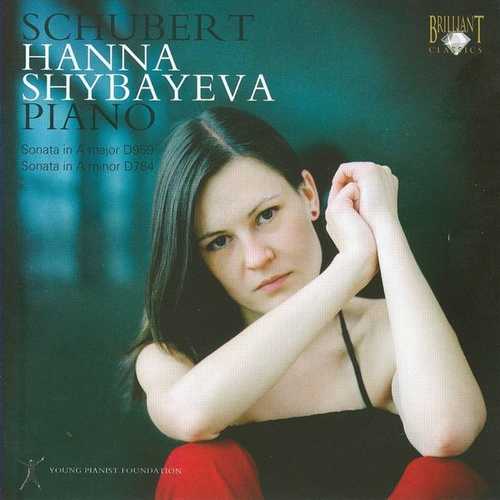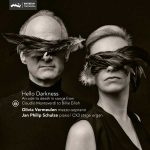

Composer: Franz Peter Schubert
Performer: Hanna Shybayeva
Format: FLAC (tracks)
Label: Brilliant Classics
Catalogue: 93913
Release: 2009
Size: 168 MB
Recovery: +3%
Scan: cover
Piano Sonata No. 20 in A major, D959
01. I. Allegro
02. II. Andantino
03. III. Scherzo: Allegro vivace
04. IV. Rondo: Allegretto
Piano Sonata No. 14 in A minor, D784
05. I. Allegro giusto
06. II. Andante
07. III. Allegro vivace
New recording: one of a series of releases from Brilliant Classics featuring outstanding young artists who have won the principal prizes at the Young Pianist Foundation’s National Piano Competition.
Shybayeva ‘impresses with a solid sense of form and imaginative and rich colouring of her playing’. NRC Handelsblad reviewing a recital
Hanna Shybayava was born in Belarus in 1979. A student of Naum Grubert, she won the 2001 YPF National Piano Competition and has attended masterclasses with Murray Perahia and Emanuel Ax. Her recital on this Brilliant Classics disc is of two of Schubert’s greatest sonatas.
The A minor Sonata D784 dates from 1823. The period from 1821 to 1825 saw Schubert start and abandon many sonatas and symphonies – struggling to establish his mature and individual voice. Many of these unfinished works provide a fascinating view into the mind of this intense and private artist. The huge torso of the C major Sonata D840 – consisting of the first two movements, half the scherzo, and a finale that breaks off without warning to nothing – is a prime example. The Seventh and Eighth Symphonies (the latter being the famous ‘Unfinished’), though fragmentary, point the way to Schubert’s mature style, free of the influence of Haydn and Mozart, and, most importantly a voice that was as unique and powerful as Beethoven’s. The piano-writing is almost orchestral. It is unflashy, stark, and with constantly changing moods. The A major Sonata D959 was started and completed along with its companion sonatas D958 and 960 in September 1828.
It is an austere work, and on a large scale, with a pensive menuetto in place of the traditional scherzo, and a brooding, wintry finale, obsessive almost in its gloom – very much in the spirit of Winterreise. Less than two months after completing the work, Schubert was dead. Originally intended for dedication to Hummel, the three sonatas were not published until 1838, a year after Hummel’s death. The publisher Diabelli dedicated them to Schumann.
Although it bears the logo of the discount-oriented Brilliant label from the Netherlands, this disc is a production of an organization called the Young Pianist Foundation that works to further the careers of young Dutch pianists. With high-powered financial help from the giant ING banking firm in their corner, the artists involved get wide distribution of a kind generally unavailable to their peers in other countries. The Belarus-born pianist Hanna Shybayeva lives up to the efforts made on her behalf with this Schubert sonata program; her interpretation of the much-recorded Piano Sonata in A major, D. 959, is anything but by the book and reveals a fine developing talent. Shybayeva immediately announces her intentions in the sonata’s Beethovenian opening material, which she treats with an unusual freedom of tempo.
That introduces an almost fantasy-like reading of both that work and the Piano Sonata in A minor, D. 784. One advantage of Shybayeva’s approach, beyond its generally involving quality, is that the highly dissonant climax of the slow movement of D. 959 doesn’t seem quite as radical as it does in the general run of recordings; rather it emerges from a flow of events that has already been surprising, fantastic, and highly pianistic up to that point. Clocking in at more than three minutes longer than Alfred Brendel’s version for Philips and seven minutes longer than Artur Schnabel, Shybayeva forges an original, discursive vision of the big A major sonata. There are, it’s true, points where the long line is lost and the relation of part to whole becomes strained, but this release clearly identifies Shybayeva as a young artist to watch.



